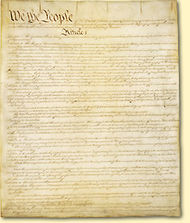Constitutional supremacy
 From Conservapedia - Reading time: 3 min
From Conservapedia - Reading time: 3 min
Constitutional supremacy is the belief that the United States Constitution is superior to all three branches of government[1] - in particular, that the Constitution is not what judges prefer it to be.[2] Natural Law, Social contract theory, and the written(codified) constitution are all important features that contribute to the notion of constitutional supremacy.[3]
The two primary tools of constitutional interpretation are the "plain meaning" rule and the "intention of the framers" rule.[2]
Constitutional supremacy is the opposite of Judicial supremacy, as judicial supremacists believe judges can remake the constitution any way they see fit.
Contents
Fundamental principle[edit]
John Marshall, who expounded a belief in the supremacy of the Constitution, wrote in Cohens v. Virginia:
The fate of the Constitution will not then depend on judicial decisions. But, should no appeal be made to force, the States can put an end to the government by refusing to act. They have only not to elect Senators, and it expires without a struggle.
It is very true that, whenever hostility to the existing system shall become universal, it will be also irresistible. The people made the Constitution, and the people can unmake it. It is the creature of their will, and lives only by their will.
Marshall correctly observes that popular sovereignty is the most fundamental of all principles, and that constitutional supremacy is a direct derivative of that sovereignty.[4] Marshall frequently expounded this viewpoint, including in his most well known ruling, Marbury v. Madison. According to Michael Stokes Paulsen, professor of law, the logic of Marbury implies "not, as it is so widely assumed today, judicial supremacy, but constitutional supremacy - the supremacy of the document itself over misapplications of its dictates by any and all subordinate agencies created by it". Paulsen notes that Marshall's wording appears to be paraphrasing from Federalist No. 78, where Alexander Hamilton also wrote of the supremacy of the Constitution over all branches of government, including the judiciary.[5] He wrote that "A constitution is, in fact, and must be regarded by the judges, as a fundamental law".[6]
An important aspect regarding the supremacy of a Constitution involves the amendment process and a distinction between ordinary law and extraordinary law.[7] Under other forms of supremacy, a Constitution is treated along the same lines as any other form of law without having its own importance or prestige.[8]
Presidential Oath[edit]
One example of constitutional supremacy is the presidential Oath of Office, found in Article II, Section One, Clause 8 of the United States Constitution.[9] The oath reads:
I do solemnly swear (or affirm) that I will faithfully execute the Office of President of the United States, and will to the best of my ability, preserve, protect and defend the Constitution of the United States.
Supremacy clause[edit]
For a more detailed treatment, see Supremacy Clause.
The supremacy clause of the Constitution is another example of its primacy over all other law and authority. Just as the Presidential Oath establishes the Constitution above the president, the supremacy clause places the Constitution above the states, their laws, and their judicial rulings so as to try to prevent a non-uniform mix of conflicting laws.
See also[edit]
References[edit]
- ↑ The Constitution: An Introduction, The Constitution is supreme. It is the written Constitution that prevails over every other source of authority in the United States., p. 26
- ↑ 2.0 2.1 Constitutional Interpretation
- ↑ The Oxford Handbook of Law and Politics
- ↑ Human Rights, Constitutional Law and the Development of the English Legal System: Selected Essays
- ↑ The Myth of Marbury v Madison
- ↑ Constitutional Protection of Human Rights in Latin America: A Comparative Study of Amparo Proceedings
- ↑ The Human Rights Act and the British Constitution, p. 4, "1 the possibility of distinguishing between constitutional and other laws; 2. the legislator's being bound by the constitutional law, which presupposes special procedures for amending constitutional law, ...; and 3. An institution with the authority in the event of conflict to check the constitutionality of governmental legal acts."
- ↑ In Marbury, Marshall raises the Constitution up above "ordinary law" to a status of "extraordinary".
- ↑ America's Constitution: A Biography
External links[edit]
- A Lived, not ‘Living’ Constitution, by Michael S. Paulsen and Luke Paulsen
 KSF
KSF